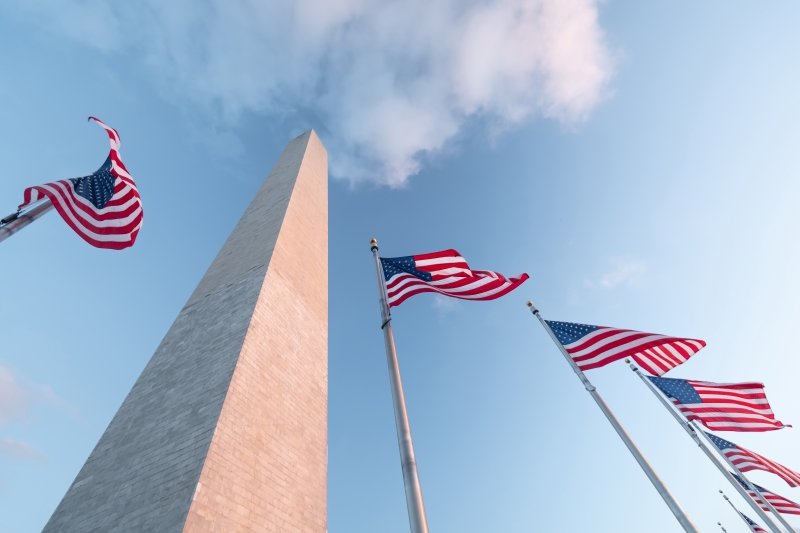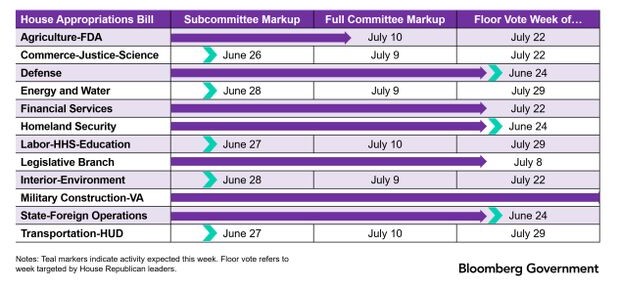Government Affairs and Policy Report – June 2024

Legislative
Nutshell
Congress continues to work through funding fights over FY 2025 appropriations, as the House began moving appropriations bills in advance of the August recess. Both parties are preparing for the start of presidential debates as the election season continues to ramp up over the summer months. The House is just returning from a week’s break, and the Senate remains on break until July 8.
FY 2025 Appropriations
Although the House and Senate have yet to reach an agreement on overall funding levels for FY 2025, the House moved 6 of the 12 appropriations bills through the committee process in June and plans to vote 3 of those bills out of the House this week. Also, House appropriators intend to introduce the 5 remaining appropriations bills this week. As to overall funding, it, again, basically comes down to Republicans wanting to spend more on defense (1% increase from FY 2024 levels) and impose cuts on non-defense programs (6% cut), whereas Democrats want equal increases to funding between defense and non-defense programs. So far, the markups of the bills have been very partisan, with attempts to add controversial policy amendments to the bills (such cutting salaries of military officials, stripping funding for Ukraine, or measures related to LGBTQ activities).
One of the three bills the House is expected to vote on this week is the Homeland Security appropriations bill (H.R. 8752), which includes funding for the Intercity Bus Security Grants program. The House bill currently sets the funding at $2 million; however, there is a bipartisan effort, led by Reps. Rose, Miller-Meeks, and Ruppersberger, to increase this number to $5 million through an amendment. This amendment, championed by ABA, has the potential to significantly boost the program’s funding, just as it did in FY 2024 (although it was later cut through final negotiations). You can view the House appropriations status table published by Bloomberg below:

Senate appropriators have yet to set a schedule to move their bills; however, several subcommittee chairs expressed their goal of starting markups when the Senate returns from the July 4 break, on or about July 8.
Nonetheless, based on prior years, most in Washington believe that even if a few less controversial appropriations bills are voted upon, a continuing resolution will eventually be needed to keep the Government funded beyond the September 30 fiscal year deadline. Once a CR is in place and the elections occur, a lame-duck session will likely lead to a final FY 2025 funding deal.
2025 Elections
With the House and Senate party margins so close and the presidential term ending with unpopular candidates appearing to be the front runners for the two major parties, so much in Washington is currently driven by the November elections. All branches of the Federal Government, in some shape or form, play a role in the 2024 elections. This includes the Supreme Court, which has faced recent ethics scrutiny due to several justices’ activities and is scheduled to issue rulings in several high-profile cases.
Regulatory/Administrative
US DEPARTMENT OF TRANSPORTATION (USDOT)
US DOT Publishes Technical Amendments to Procedures for Transportation Workplace Drug and Alcohol Testing Programs Final Rule
On June 21, the US Department of Transportation (DOT) published technical amendments to clarify and correct the final rule, which included oral fluid testing as part of its regulated industry drug testing program. The technical amendments became effective on June 21.
US DOT Publishes Direct Final Rule and Requests Comments on Revisions to Drug Testing Procedure Final Rule
On June 21, the US DOT published a direct final rule to revise its final rule to allow oral fluid testing as part of its regulated industry drug testing program. The direct final rule would provide temporary qualification requirements for mock oral fluid monitors, provide for consistent privacy requirements by identifying which individuals may be present during an oral fluid collection, and clarify how collectors are to specify that a sufficient volume of oral fluid was collected. The direct final rule is effective on Aug. 5. The US DOT also requested comments on the proposed changes, which are due by July 22.
FEDERAL MOTOR CARRIER SAFETY ADMINISTRATION (FMCSA)
New Motor Carrier Registration Process
On April 19, FMCSA published an information collection request (ICR) to support developing a new online registration process. If approved, the new process would modernize the Unified Registration System and replace it with a process that will be renamed the “Federal Motor Carrier Safety Administration Registration System.” Comments on the information collection request were due June 18, 2024.
School Bus Driver CDL Test Exemption Renewal
On May 30, FMCSA requested comments on the National School Transportation Association’s (NSTA) application to renew its exemption from the “under-the-hood” testing requirement for commercial driver’s license applicants seeking a school bus endorsement. The current exemption is effective from Nov. 28, 2022, through Nov. 28, 2024, and is limited to drivers conducting intrastate operations. Comments are due July 1.
Public Meeting on Disclosure of Towing Fees
On May 31, FMCSA announced it will host a public meeting to receive feedback on current industry practices regarding the disclosure of towing fees to commercial motor vehicle owners. The meeting was held on June 21, 2024. You can view a recording from the meeting. The comment period for any feedback from this meeting has been extended. Comments are due by August 1, 2024.
Listening Sessions on Safety Rating System
On June 7, FMCSA announced it will host listening sessions to gather feedback on proposed updates to the current safety fitness determination (SFD) model. Details on the feedback FMCSA is seeking can be found online. The first listening session will be held in person on June 29, 2024, and two additional virtual listening sessions will be held on June 25 and July 31, 2024.
FY 2025 Unified Carrier Registration Fees
On June 17, the FMCSA published a final rule (including a fee schedule at the end) setting the 2025 Registration Year fees for the Unified Carrier Registration (UCR) program. The fees for RY 2025 will be about 25% more than in 2024. All states must enforce UCR requirements, whether or not a member state participant. The UCR applies to all motor carriers required to register with FMCSA, including operators in Canada and Mexico. The 2025 UCR registration period will begin on October 1, 2024.
Agency Moves
Vinn White was named Acting FMCSA Administrator and Deputy Administrator on June 25. Sue Lawless has moved to the Chief Safety Officer and General Counsel role.
FEDERAL TRANSIT ADMINISTRATION (FTA)
Rural Area Circulars and Grant Guidance Update – On April 4, FTA published notice of a proposed new circular titled “Rural Areas Formula Grant Programs Guidance Proposed Circular.” This new circular combines existing program guidance on the Bus and Bus Facilities Formula Program (the rural component) and the Rural Area Formula Grants Program, including the 5311(f) grant program. It also proposes moving sections from the current circular concerning equipment management to another circular. Comments are due June 3, 2024. ABA has created a template to assist with filing comments.
NATIONAL HIGHWAY TRAFFIC SAFETY ADMINISTRATION (NHTSA)
Safety Standards for Hydrogen Powered Vehicles
On April 17, NHTSA published a notice of proposed rulemaking or NPRM to establish two new Federal Motor Vehicle Safety Standards (FMVSS) specifying performance requirements for all motor vehicles that use hydrogen as a fuel source. In early June, NHTSA extended the comment period; comments are now due July 17.
US DEPARTMENT OF HOMELAND SECURITY (DHS)
FEDERAL EMERGENCY MANAGEMENT AGENCY (FEMA)
Applications for FY 2024 Intercity Bus Security Grants
On April 16, the DHS released the FY 2024 Notice of Funding Opportunity or NOFO Announcement for the Intercity Bus Security Grant Program (IBSGP). The total funding amount available for FY 2024 is $1.8 million. View an application webinar. Completed applications are due by June 24, 2024.
CYBERSECURITY AD INFRASTRUCTURE SECURITY AGENCY (CISA)
Cyber Incident Reporting Rules
On March 28, DHS published an NPRM to establish rules for reporting cybersecurity incidents and ransom payments to CISA. In early May, CISA corrected the original NPRM and extended the comment period.
NOTE: The proposal applies the requirements to Over-the-Road bus (OTRB) operators regulated under 49 CFR 1584, i.e., fixed route operators providing services to 10 threat urban areas: Anaheim/Los Angeles/Long Beach/Santa Ana Areas, San Diego, San Francisco, DC National Capital Region, Chicago, Boston, New York City/Jersey City/Newark Area, Philadelphia Area/Southern New Jersey Area, Dallas-Fort Worth/Arlington Area, and Houston. Comments are now due July 3, 2024.
US DEPARTMENT OF LABOR (DOL)
WAGE & HOUR DIVISION (W&H)
Overtime Pay Thresholds
On April 26, the DOL’s WHD announced a final rule increasing the salary thresholds triggering federal overtime pay or exemption requirements for salaried executive, administrative or professional employees. The annual salary threshold trigger will increase to $43,888 on July 1, 2024; and automatically increase to $58,656 on Jan. 1, 2025. For highly compensated employees, the rule will adjust the threshold starting July 1, 2027, with salary thresholds updated every three years, using up-to-date wage data to determine new salary levels.
US ENVIRONMENTAL PROTECTION AGENCY (EPA)
Greenhouse Gas Phase 3 Rules Finalized
On April 22, the EPA published a final rule, “Greenhouse Gas Emissions Standards for Heavy-Duty Vehicles – Phase 3,” that sets new standards to reduce greenhouse gas emissions from heavy-duty (HD) vehicles beginning in model year (MY) 2027. Recognizing the challenges of transitioning OTRB vehicles to zero-emission, motorcoach engines/manufacturers should not be heavily impacted in the short term, up to MY 2032. The final rule became effective June 21, 2024.
$932 Million Grant Program to Fund Clean Heavy-Duty Vehicles, Available for Application
On April 24, EPA announced availability of over $930 million in grants for the purchase of clean heavy-duty (HD) vehicles, but it is limited to Class 6-7 vehicles (school buses are eligible, but not OTRB Class 8 buses). Applications are now open for the competitive grant program. Eligible applicants for this funding opportunity include state and local governmental entities; public school districts; and nonprofit school transportation associations. Applications are due July 25.
US DEPARTMENT OF JUSTICE (DOJ)
US DRUG ENFORCEMENT ADMINISTRATION (DEA)
Regulation of Marijuana
On May 21, the US Drug Enforcement Administration (DEA) issued an NPRM to reclassify marijuana from a Schedule I drug to a Schedule III drug, thereby loosening federal DEA restrictions. Synthetic THC will remain in Schedule I. Comments are due July 22, 2024.
OTHER ISSUES
New York City
Congestion Pricing/Tolling
After a lengthy process and concerted opposition, on June 5, New York Governor Kathy Hochul announced an indefinite postponement of the proposed congestion pricing program that was to go into effect on July 1, affecting OTRB operations in the city’s central business district.
